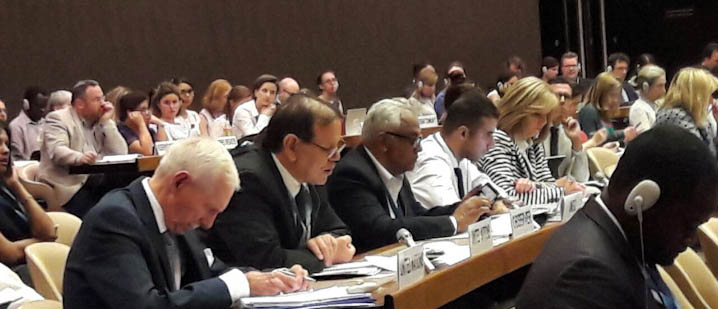Geneva: CNDH participates in The Third Informal Thematic Session on the negotiating process leading to the Global Compact for Safe, Orderly and Regular Migration

The National Human Rights Council of Morocco (CNDH) participates in The Third Informal Thematic Session on the negotiating process leading to the Global Compact for safe, Orderly and Regular Migration on 19 June 2017, in Geneva.
Initiated by the UN General Assembly, this session tackles “International cooperation and governance of migration in all its dimensions, including at borders, on transit, entry, return, readmission, integration and reintegration”.
A delegation of the CNDH led by Mr. Driss El Yazami, CNDH President and composed of Ms. Aminata Pagni, Migrant rights officer, Mme. Ghizlane Kabbaj and Malak Bensghir, human rights officers at the CNDH.
The CNDH participates in this session as the African focal point of the Global Alliances of National Human Rights Institutions (GANHRI) in charge of following up on the Global Compact process with view to supporting NHRIs’ participation and contributions to all stages of the consultation process.
Mr. Abdelhamid El Jamri, Rapporteur of the Committee on the Protection of the Rights of All Migrant Workers and Members of Their Families, highlighted “the need to involve civil society and NHRIs, particularly from Africa, in the process of adopting the Global Compact”. He stressed that “African NHRIs, which met last May in Niamey, Niger, expressed clearly their willingness and readiness to engage in the debate on the Global Compact”.

This session is a part of a series of informal thematic sessions on facilitating safe, Orderly and Regular Migration under UN General Assembly Resolution No. A/RES/71/280 on the modalities of the intergovernmental negotiations on the Global Compact for safe, Orderly and Regular Migration adopted on 6 April 2017.
The High-level meeting held on 19 November 2017 at the UN headquarters in New York launched a process of negotiations which should lead to the adoption of the Global Compact on Migration by 2018 (Resolution A/RES/71/1 dated 19 September 2016). The resolution unanimously recognized the need for a comprehensive approach to issues related to human mobility.
Following this Summit, it was decided to initiate a process for the adoption of two separate international Compacts: one on migration and another on refugees. It was also agreed by member states that the Global Compact on Migration should be developed according to an inclusive process of consultations and negotiations involving States, NHRIs, civil society, communities and migrants themselves.
In September 2013, the CNDH published a report on “Foreigners and Human Rights in Morocco - For a radically new asylum and migration policy”. The report called for a genuine public policy that protects human rights, based on international cooperation and integrating civil society. The Moroccan government has interacted positively with the recommendations of the Council and initiated a new migration policy based on both a global and humanist approaches.
This policy has considered the essence of the international law and multilateral cooperation and has started with the important steps: launching a campaign to document irregular migrants, appointing a national appeal committee, and launching a process to reform legislations governing migration, asylum, and trafficking in persons.






















